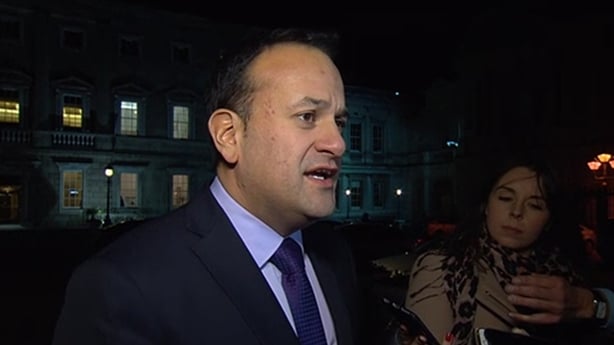Minister for Health Leo Varadkar has definitively ruled out pressing ahead with the Government's original plans for universal health insurance.
"The Government remains committed to effective universal healthcare, which is defined as access to affordable, effective quality care for everyone in a timely way,” Mr Varadkar said.
“A system of Universal Health Insurance is still our preferred model to achieve universal healthcare.
"However, the high costs for the particular model of health insurance analysed in the new ESRI report are not acceptable, either now or any time in the future.
“The ESRI report therefore vindicates the Government's decision not to rush the implementation of UHI.

"It's clear that before we proceed and make a decision on which funding model to adopt, a number of foundations should first be in place.
"While the decision on the funding model could be made towards the end of the term of the next Government, I do not believe it could be implemented in the term of the next Government as these reforms will take at least five years to complete, in particular the increases in capacity and staffing.
"It is unlikely that there is ever a perfect time to change funding models but the ESRI and KMPG research, which is based on 2013 data, certainly points to the fact that to do so during a financial crisis would have been wrong.
“Neither the Exchequer nor families would have been able to bear the considerable additional cost in terms of subsidies or increased insurance premiums.
"The delivery of the reform programme must be completed first so that the foundations are in place to change the funding model.
"Reform in the past was rushed and as a result serious mistakes made such as at the time of the establishment of the HSE in 2005.
“When these reforms are complete, we intend to revisit the precise model of universal health insurance, and will compare the pros and cons of a number of funding options.
“The decision on which model to adopt will be made by the next Government and implemented in the term of the Government after that," Mr Varadkar added.
Additional costs of more than €650m
A new study published today by the ESRI has found that the White Paper model of Universal Health Insurance would increase overall health spending here by up to 11%.
This study by the ESRI, says that the proposed model of Universal Health Insurance, would increase health spending, by between €666m and over €2bn a year.
Lead-author, Dr Maeve-Ann Wren, says that Competition Law would also limit Government's ability to control pricing and insurers' margins.
In its report, 'An examination of the Potential Costs of Universal Health Insurance in Ireland', The ESRI recommends further research into alternative UHI models.
Meanwhile, Fianna Fáil's spokesperson on health earlier said the Government is abandoning one of its core principles on how health care is funded in the years ahead, describing it as "extraordinary".
Billy Kelleher told RTÉ's News At One that Universal Health Insurance was a key component of Fine Gael's programme for Government and the party, on the eve of an election, is now abandoning it.
He said there are more people on trolleys than ever before because this Government decided to abolish the National Treatment Purchase Fund and go off on a "half baked notion of introducing Universal Health Insurance".
He said the Government should not be applauded for abandoning the policy, when they have been tearing the heart out of our health services and public health system.
One of the biggest cases of 'political mis-selling' in recent history
The Irish Medical Organisation today said it is now clear that the policy of Universal Health Insurance is being shelved and the only question remaining is when the Government will officially disown it.
The IMO has strongly criticised the policy of Universal Health Insurance from the outset. The organisation described UHI has "a harsh insurance-based financial model mis-sold by the Government as a commitment to equitable health care".
The IMO said: "UHI was nothing more than a vehicle to decimate the public health services and to maximise profits for private insurance companies while giving them a pivotal role in determining who receives what healthcare. That can never be good for patients."
Speaking today, President of the IMO Dr Ray Walley said the Government's promotion of Universal Health Insurance was one of the biggest cases of "political mis-selling" in recent history.
He said: "UHI was mis-sold as a commitment to Universal Health Care but it was never about that. UHI was about a new financial management model. A clear distinction must be drawn between UHI and Universal Healthcare.
"The key beneficiary of the UHI model are the private insurers and there are no improved outcomes for patients. Government should focus on a plan to provide a properly funded Universal Healthcare model either through taxation or social insurance and there are many examples where this has been achieved successfully," he said.
"At all costs public health services must be kept under public governance. The first priority of our healthcare system must be the welfare of patients and introducing a UHI model puts patient interests in direct conflict with commercial enterprises," Dr Walley added.

